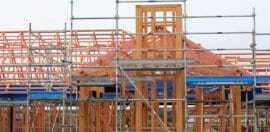Australia’s rental affordability crisis remains despite COVID welfare boost

2 December 2020 at 5:44 pm
The latest Rental Affordability Index reveals the temporary welfare increase has brought little relief for low-income households
While the JobSeeker coronavirus supplement has been a welcome boost for 22-year-old Fatima*, it has still not been enough to lift her out of homelessness.
She is currently couch surfing with friends in inner-city Melbourne, while looking for a place to rent and stable work.
With the supplement, which has already recently been reduced, set to be cut even further at the end of December, Fatima has been pushed to breaking point.
“I had so much hope that with the [extra] money and looking for casual jobs I could actually find a rental house. But now with that ending, it has really impacted me,” she told Pro Bono News.
“I had a mental breakdown for a couple of days where I thought ‘what am I going to do?’ I made an appointment with [a counsellor] although I haven’t had contact with them yet.
“No one can do anything to help. So that just makes me more stressed and more overwhelmed.”
But Fatima’s story is far from unique.
The latest Rental Affordability Index (RAI) has revealed that while the coronavirus supplement has improved rental affordability for JobSeeker households, recipients nationwide are still facing moderate to extreme rental stress – defined as paying more than 30 per cent of their income towards rent.
The RAI report – released annually by National Shelter, Bendigo and Adelaide Bank, SGS Economics and Planning, and the Brotherhood of St Laurence – measures rental affordability for households until the June quarter of 2020.
Even before the supplement was first reduced in September, single people on JobSeeker were still paying 42 to 69 per cent of their income on rent in every capital city.
Adrian Pisarski, the executive officer of National Shelter, said the supplement was evidently not enough to lift low-income people out of rental stress.
“This shows the depth of our rental affordability problem, where even with doubled income support, there is not one place in Australia where a JobSeeker recipient can rent affordably,” Pisarski said.
The coronavirus supplement was originally set at $550 per fortnight in March, but was reduced to $250 in September and will fall to $150 at the end of December.
Professor Shelley Mallett, the director of research and policy centre at Brotherhood of St Laurence, said these reductions would have a devastating impact on low-income people.
“We can expect that the September reduction to JobSeeker will further increase rental stress and disparities of this cohort,” Mallett said.
“Coupled with the economy not re-creating jobs and a relatively high unemployment rate, many households are being trapped in a poverty cycle.”
Fatima graduated from university last year and has only been able to find short-term casual work since then.
She has unsuccessfully applied for more than 100 jobs, and her situation is made all the more difficult by her unstable living situation.
“Even if I were to get a work-from-home role, it would be hard because I don’t have my own house to live in,” she said.
Even when the supplement was at its highest rate, she still struggled because she had family back home in Somalia she had to send money to.
“And Centrelink money is not stable. Things can change, like with the supplement you never know if the government will just decide [to end it],” she said.
“The only way that you can survive is sharing with someone else. It’s not easy to find people. And minority people are even less likely to find a shared house that is close to where we want to work or study.”
Fatima has applied for social housing but with Victoria’s waiting list filled with more than 100,000 people, she is unlikely to find a place any time soon – despite a recent $5.3 billion investment from the state government.
Economic experts say amid the turmoil of COVID, now is the time for other states and territories to urgently invest in more social housing.
Ellen Witte, a partner at SGS Economics and Planning, said a $7.8 billion investment would create 15,500 to 18,000 jobs over four years and boost the nation’s social housing stock by 30,000.
St Vincent de Paul Society has also used the RAI report’s findings to call on the federal government to establish a social housing fund of at least $10 billion to help the states and territories remedy the housing shortage.
As for Fatima, she just hopes she will be able to find a job she loves so she can afford her own rental.
But she knows how difficult it can be when the job market is so precarious.
“You can lose your job and if you’re in a rental [property] and you don’t have enough money saved, it could be a problem. That’s just a little worry I have at the back of my head,” she said.
“That’s why I need to find a stable job. Then I would be able to pay for a rental and I could live a happy life.”
*Not her real name
If this article has raised any issues for you, please call Lifeline on 13 11 14







